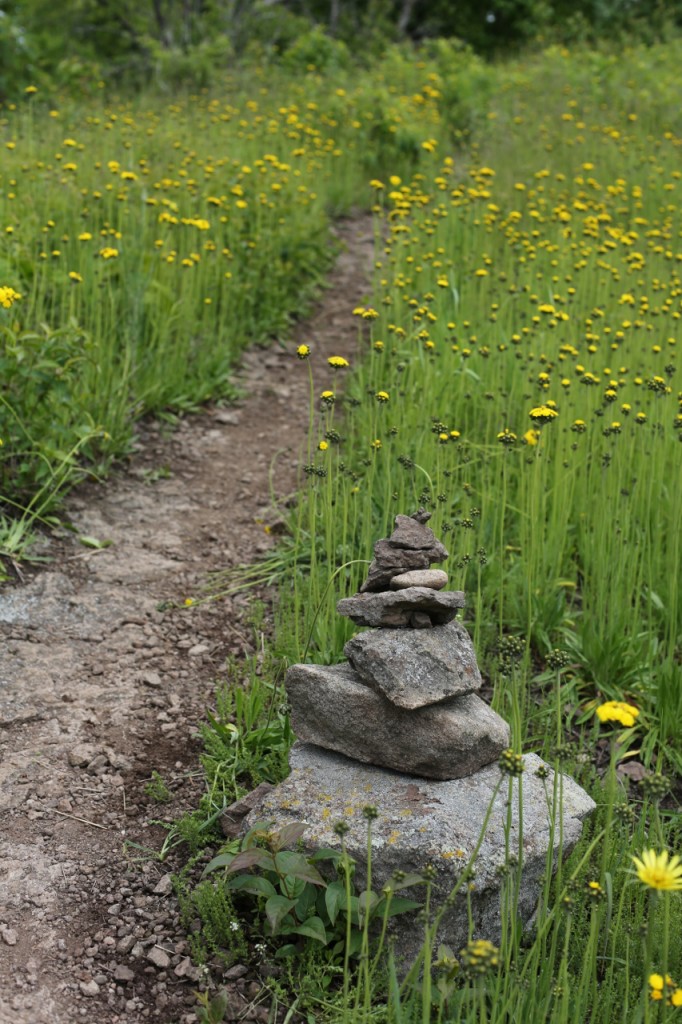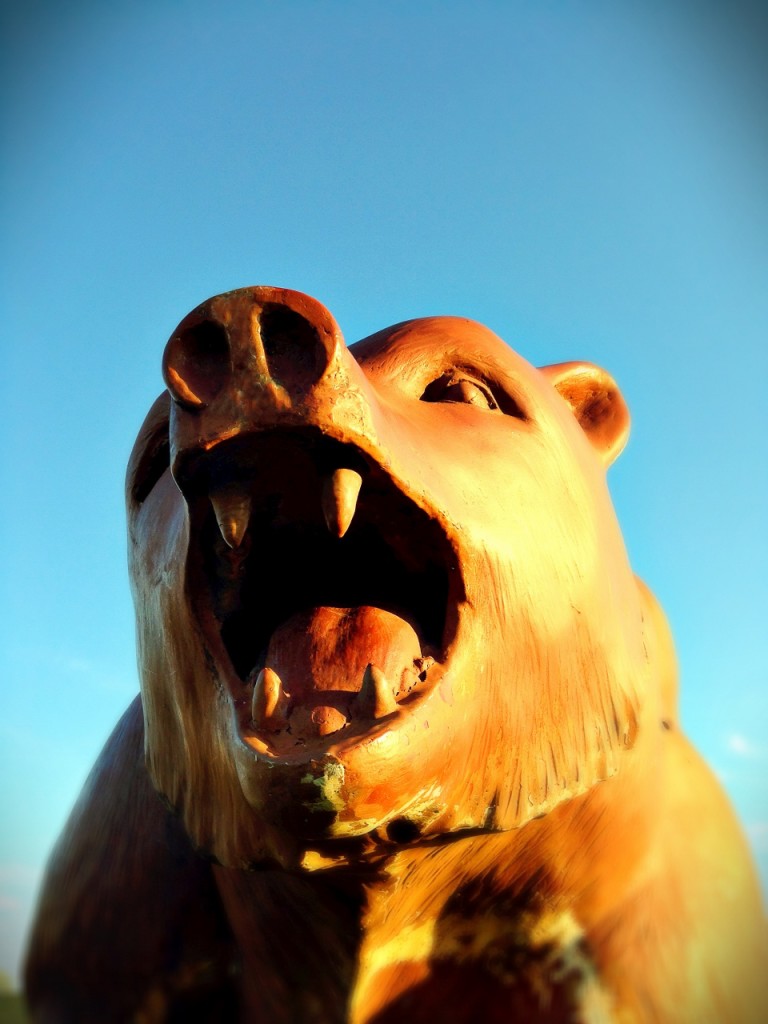
By Mallory McDuff
During bear season in the mountains, try to run on the trails with a friend. Talk loudly. Speak with candor about your students, your children, and even your sex life at a high volume, so bears run from your voice. (Remember that if a friend tells you something confidential, even at a high volume, the info stays “on the trail.”)
If you are alone, clap your hands several times before you come around a corner. Attempt to reconstruct the details of the email that ecologist Dr. Lou Weber used to send to the college community, with tips for random encounters with black bears.
Did she instruct you to stand your ground and yell—or to be quiet? Recall a video posted on Facebook of one of your running buddies, the education professor, screaming like a crazy lady at a bear in her backyard, while her spouse yelled, “He’s hissing, honey, he’s hissing!”
As you run, ponder why you can never remember the details of information that actually matters—like how to stand your ground with a bear—but you know when your favorite authors stopped dying their hair. Question if you will ever get highlights again, now that your stylist of a decade has moved to be closer to her aging parents.
Smell the bouquets of white and pink rhododendron. Inhale. Exhale. Breathe.
Say a small prayer for the beauty of this college campus where you live and work, where a run can give you a jolt of adrenaline or a hit of dopamine. Realize that you didn’t notice the rhododendron yesterday, when you ran with the Spanish teacher, because you both were venting about your teenagers. (But that felt good, too).
Recognize that it doesn’t matter if you get highlights or not since you haven’t had sex or even seen an attractive man in six months. And you don’t have the patience or the time to cast your net on Match.com. As a heterosexual female living in the most gay-friendly town in the South, you can go grey in peace. Hell, men go grey everyday: the look is distinguished.
Give up your dream of looking like Lauren Bacall when she was featured in her late sixties on the cover of the JCrew catalog, with her blond highlights and slight gap between her front teeth.
Plan to visit the JCrew distribution outlet in Asheville, since you haven’t bought clothes in at least four years. Pride yourself on your new uniform of a tank top and cardigan, a look stolen from another friend who wears the same outfit as her established style. Remember that she is from Connecticut and you are from Alabama. No one wears cardigans in the Deep South because it’s too damn hot.
Continue running on a trail called Suicide Ridge, a steep incline that you’ve run (or walked) almost everyday for fifteen years. This run is like your cardigan of trail runs. It’s a routine. Observe that the signage for the trail features the new name Broyles Ridge, a substitution for the more ominous Suicide Ridge.
Think about the horrific suicides of a college student and two children of staff members at the college over the past decade. Resolve to tell your children, yet again, to call someone they trust if they ever want to kill themselves, even though such admonitions mean nothing in the face of mental health crises. Remember your teenager’s last response to this plea: She rolled her eyes and said, “Why are you telling us this again?” Give a prayer of thanks for your own drugs that help to tether you to sanity every day.
Run past more rhododendron. Listen to the knocking sound of a red-cockaded woodpecker pounding on a tree trunk. Pause to pee on the side of the trail and remember when your friend Susan peed on a run, and a hiker walked past her.
“Well, this is awkward,” she said with a gracious Southern smile from her squatted perch on the ground. Reflect that all your friends pee more on your runs than they did ten years ago. Feel grateful that you can run.
Jog past the river, as the trail meanders by two older men throwing rocks into the water. Sneer at a dog owner who refuses to put his dog on a leash, even when the wet dog shakes water all over your leg. “He just wants to be friends,” the owner says.
“I’m allergic to dogs,” you respond, because someone has to be the middle-aged runner, irritable because of a dearth of physical intimacy or because of a full life with a teenager and a nine-year-old in a nine-hundred-square foot home.
Continue past the college farm and wave to the milking cow and the sheep. Since no one is around, call out “BAHHH! BAHHH!” and marvel at how good that feels. Just for the hell of it, call out “MOO!” to the cow. Turn to see one of your students walking out to milk the cow. Smile and wave with the pleasure of being fifty years old and for once, not giving a shit what someone thinks. Wonder how long this elated feeling about aging will last.
Notice the shades of pink and red in the eastern sky, as the sun rises over the farm.
Inhale the smell of the new day. See the yellow pollen floating in the morning air. Resolve to show more empathy for the students who may not be prepared for today’s assignments.
Turn left up a steep trail that leads to Christmas Tree Hill. Resist the urge to walk and continue running to the top of the hill and slow to a jaunt around a bend.
Stop to realize that there is a couple having sex—that’s right—having sex with full penetration in the middle of the trail.
Lose all sense of empathy, as well as balance. Glance behind to ensure you are not in some documentary, a college assignment to film people’s reactions when confronting outdoor sex. There are no cameras.
Realize that you could turn around, retrace your steps, and remove yourself from the situation, as your mother always advised. But fifty-year-old trail runners don’t run away. They stand their ground.
Observe that the male is on the bottom, lying on a blue tarp. His face is toward you, while the women is on top, with her bare back and booty facing you. (Feel a pang of remembrance for the comfort of that position.) Resolve that you are going to continue on the trail, but there will be an encounter. You will not go quietly, as you now recall that Dr. Lou Weber’s instructions about bear encounters indeed advised making NOISE.
Watch as the girl twists her torso to talk to you, just a few yards away. Recognize her face from the college library, as she helped you to check out two educational psychology books last week; now you are checking out her sexual acts, without invitation or desire to do so.
Realize that this young couple has no intention of changing their positions. You are like a phone call put on hold until you hang up. You are in their outdoor bedroom, and you have to walk past their bed to exit the door.
Explain in your most grown-up voice that you have to pass by them: This is a trail used by many runners and hikers, including children, you say.
“Oh that’s fine, you can go right by,” she says.
Feel awkward, much more awkward than encountering a hiker while peeing. And the most awkward part of the whole experience is that they don’t feel awkward at all. It’s like cognitive dissonance on steroids.
Run.
Continue running on beds of pine needles, a soft cushion to your pace. Wonder why you did not say something funny to them like, “Watch out I may ‘come’ again.” Remember that’s not your style. Imagine that they are still going at it, with much more endurance than many middle-age men. Feel your heart race and your face flush, and not from the running.
Start laughing as you run all the way home, to your simple duplex with an expansive view of fields and forest. Feel another wave of gratitude and reach for the best drug you know, a phone call to a female friend, who answers on the first ring.
Stand outside and drink long gulps of cold water while you tell the story to your friend. Listen to the peals of your own laughter, echoing across the valley. From your description, the friend actually recognizes the two students, who had disclosed their plans to camp in that exact spot.
Resolve to forget their names, as quickly as you forgot the tips for bear encounters. Before you hang up the phone, make plans to run the trails again tomorrow morning, at the break of a new day.
•••
MALLORY MCDUFF teaches at Warren Wilson College in Asheville, North Carolina, where she lives on campus with her two daughters. She is the author of Natural Saints (OUP, 2010) and Sacred Acts (New Society Publishers, 2012). Her work has been featured in publications including The Rumpus, BuzzFeed, USA Today, Sojourners, and Huffington Post. Find her at: mallorymcduff.com.

 Follow
Follow
